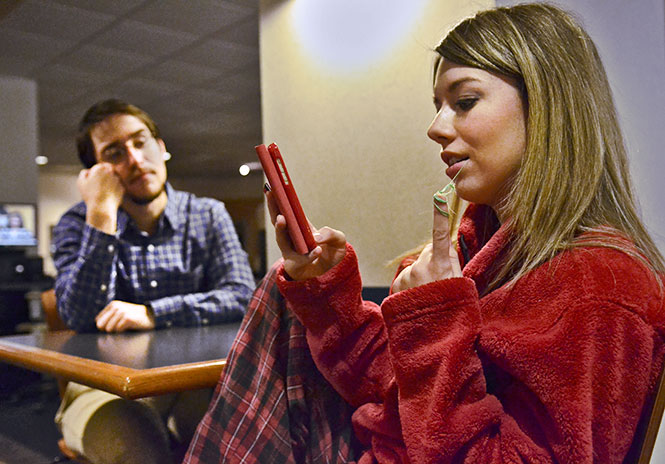Nice guys… end up on probation?
February 12, 2014
The friend zone – it’s a place described by Urban Dictionary to be, “What you attain after you fail to impress a woman you’re attracted to.”
For Meredith Kinder, it’s something completely different.
“The friend zone is essentially a place made up by rejected guys so they can put the blame on the girls instead of themselves,” she said.
Kinder is a sophomore English major at Kent State, and has had a less- than-pleasant experience with the concept of the friend zone. For Kinder, it’s not a new concept.
“I have placed guys in the friend zone” said Kinder. “[I] was reprimanded for not putting out after they were so ‘nice’ to me, because apparently they thought kindness was the only quality I look for in a guy.”
One construct to the friend zone is the “nice guy” paradigm — if a guy or a girl is nice to another guy or girl for an extended period of time, they think they are therefore entitled to something beyond friendship. However, it’s not as black and white as it may seem.
“I would define the friend zone as a place that we put people who are just shy of relationship material but more than casual friends,” sophomore public health major Clair Yee said.
“Personally, I think that the friend zone is kind a cop out for when you’re close with someone but there is something lacking that is needed to take it to relationship level,” Yee added. “Nowadays, it’s kind [of] morphed into a thing that we say when we turn someone down but we don’t want to destroy that person’s feelings.”
Sophomore physical education major Jim Lessick has his own take on the friend zone. He describes it as a mechanism that guys will hide behind.
“To an extent, I think there are some girls who guys will be friends with for a long time, and then they’ll expect something, and when they do, they’ll get that answer ‘I just see you as a friend,’” he said.
Yee puts a different perspective on things.
“We are using the friend zone as kind of a copout way to say no to people instead of actually saying no,” she said. “If you don’t want to be in a relationship don’t string them along with the possibility of it somewhere down the line.”
“I think a lot of that falls on the guy, primarily because I think we need to be a little bit more open a little more early on in the relationship,” Lessick said.
In most cases, it seems like guys are the ones constantly being put in the friend zone, and girls are the ones doing the rejecting.
“In our society, men always are expected to be the pursuers, and women are the pursued,” graduate appointee and English professor Heidi Frame said. “There’s a natural sort of situation for failure, it seems like. If we always expect men to pursue, then they’re going to fail sometimes, and end up in the friend zone.”
Men aren’t the only ones who experience the friend zone, however.
“I’m really good friends with this guy, and we’re always getting coffee and having very personal conversations,” Yee said. “Despite this, we’ve kind of friend zoned each other. We don’t really know what we want out of our relationship right now.”
“The friend zone is an inevitable construct of our society,” said sophomore theater studies major Blaise Beach. “[It’s] when a person is removed from any chance of a relationship beyond friends.”
It doesn’t always last forever, though.
“I have actually been friend zoned by all of my girlfriends [in the past],” Beach said. They didn’t want to risk losing the friendship they valued so much because of a relationship.
The construct of the friend zone won’t be broken down overnight — but acknowledging the issues could possibly be the first step.
“If I could change the construct of the friend zone I would literally just get rid of the concept all together,” said Kinder. “I just really dislike guys acting like friendship is a dating penalty box for them.”
Contact Blythe Alspaugh at [email protected]

















